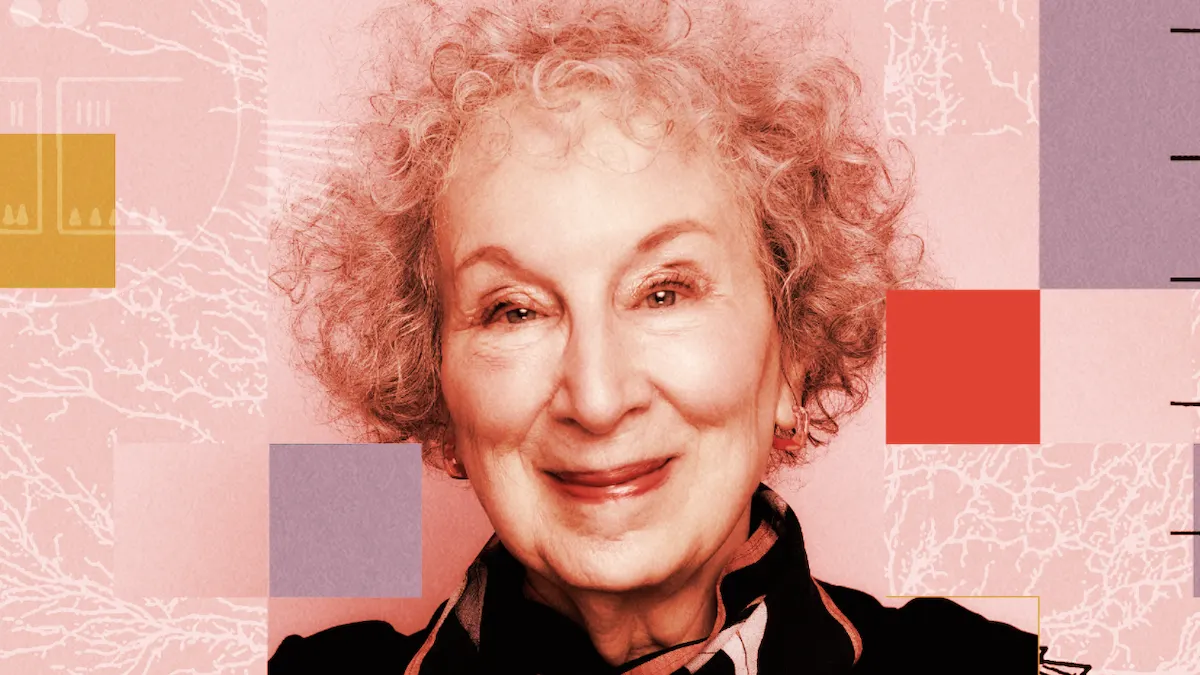Margaret Atwood is best known for her portrayal of dystopian societies, most notably in “The Handmaid’s Tale”—but now the Canadian author and poet plans to explore the potential for utopia in a new online class. And then turn the results into NFTs.
Today, Atwood and virtual learning platform Disco announced plans to include Tezos NFTs as part of "Practical Utopias: An Exploration of the Possible," an online class that she will teach beginning in September.
Participants in the eight-week live online course will work together to imagine potential utopian societies, including what they might look like. Those collaborative discoveries will be turned into illustrations, minted as NFTs on the Tezos blockchain, and then distributed among the students.
Additionally, a 1-of-1 NFT anthology that compiles all of the group’s output alongside work from Atwood herself will be auctioned off later this year. A portion of proceeds from the sale will go towards “projects working to build a better future,” according to Disco.
“Think of Practical Utopias as a sort of sandbox for grownups: the construction of imaginary communities with real solar cookers in them,” Atwood told Decrypt. “Our Practical Utopias need to be affordable, attractive, and green. So of course, the NFT component of this project needed to fit with that too. That’s why we chose Tezos.”
Tezos is a proof-of-stake blockchain network that is billed as a more energy-efficient alternative to proof-of-work blockchains like Ethereum and Bitcoin. Video game publisher Ubisoft, soccer club Manchester United, apparel retailer The Gap, and Formula One teams McLaren and Red Bull Racing are among the brands using Tezos for NFT and Web3 projects.
An NFT serves as a deed of ownership for a digital item, including things like digital artwork, sports collectibles, video game items, and more. The wider NFT market surged to $25 billion worth of trading volume in 2021, according to data from DappRadar.
Atwood first teased the collaboration with Tezos in February during an appearance on The Tim Ferriss Show podcast. She told Ferriss that minting an NFT on Tezos “consumes the same amount of energy as a tweet.”
Learning in the metaverse
The Disco learning platform was born out of the pandemic, co-founder and co-CEO Candice Faktor told Decrypt, and its remote learning environment enables creators to build classes that feature live video, chat, asynchronous elements, and more. Atwood’s class comes via the firm’s Disco Studios division, which collaborates directly with creators to design courses.
“When I told [Atwood] about Disco and asked if she would like to collaborate,” Faktor recalled, “she said, ‘Yes, but I'm definitely not teaching a creative writing course.’”
Instead, Practical Utopias spins out of familiar subject matter for the author, providing an interactive experience that lets students discuss and collaborate as they attempt to solve current and future societal concerns. Faktor said that the 82-year-old Atwood wishes to “leave a legacy of building practical solutions to some of our hardest problems today.”
The 200 fellows, or students who sign up for the complete interactive experience, will split into teams of eight people each to create their own vision of a potential utopia. The illustrations based on those collaborative visions will be turned into Tezos NFTs, and the single-edition NFT anthology will also include work from Atwood herself.
Additionally, each fellow will receive a participatory NFT. Faktor said that the NFTs will offer ongoing benefits for holders, including access to future events and experiences. Disco also plans to implement NFT badges into other courses, and they will serve as a digital certificate and memento of sorts, as well as a permanent record of creative work.
NFTs are only one part of Disco’s plans in the wider Web3 and blockchain space. The platform also powers Realm Academy, an NFT and crypto educational program created by Everyrealm, a notable metaverse land investor with notable celebrity backers. The classes actually take place within the online meterverse game Somnium Space, which runs on Ethereum and Solana.
The metaverse refers to a future version of the internet in which users will interact, play, and even work in shared 3D spaces using avatars.
Blockchain networks may power the metaverse, and many crypto firms are building in the space—but so are tech giants like Facebook. Early metaverse games like Somnium Space, Decentraland, and The Sandbox are built around NFT assets.
Ultimately, the metaverse is where Faktor sees more of Disco’s educational efforts going in the future, shifting from the current standard of video calls to more immersive experiences ahead.
“We're at the flip phone stage of where learning metaverses are headed,” she said. “It's very much the vision for Disco, this idea of learning live together.”
“Today, we're doing that over Zoom. Tomorrow, it will likely be in different metaverses where we connect and collaborate,” Faktor continued. “It's this incredible moment that you can actually have experiential learning at scale, virtually.”

